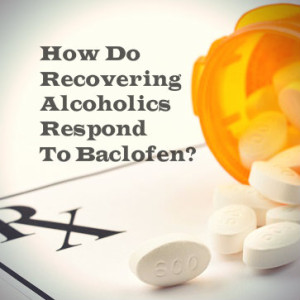How Do Recovering Alcoholics Respond To Baclofen?
Baclofen is the name of a medication originally developed to treat people affected by severe muscle spasms. Increasingly, doctors also use this medication as an off-label treatment for alcohol cravings in people going through treatment for alcoholism. In a study published in February 2014 in the journal Alcoholism: Clinical & Experimental Research, a team of French researchers assessed the dose of baclofen required to provide effective treatment for alcoholics. These researchers concluded that the effective dose of the medication can vary widely for no clear underlying reason.
How Baclofen Works And What It’s Used For
 Baclofen produces a muscle-relaxing effect by altering the rate of nerve cell communication inside the spinal cord, which forms part of the central nervous system. This effect does not cure the underlying causes of severe muscle spasms; however, it does reduce the intensity of those spasms and forms part of a larger overall treatment regimen.
Baclofen produces a muscle-relaxing effect by altering the rate of nerve cell communication inside the spinal cord, which forms part of the central nervous system. This effect does not cure the underlying causes of severe muscle spasms; however, it does reduce the intensity of those spasms and forms part of a larger overall treatment regimen.
The most well-known condition treated with baclofen is multiple sclerosis, which damages the protective coatings of the spinal nerves and nerves inside the brain. Some people also receive the medication for certain forms of spinal disease or in the aftermath of traumatic injuries that have an impact on spinal cord function. Baclofen is available in tablet form in the U.S. under the brand names Kemstro and Lioresal.
Baclofen’s Use In Alcoholism Treatment
Once a medication receives FDA approval for treatment of one condition, doctors sometimes adopt that medication as a treatment for other conditions. This type of use is commonly known as off-label use. In the early 2000s, doctors began using baclofen as an off-label treatment for alcoholism (a condition which forms part of a larger health diagnosis called alcohol use disorder). The medication achieves its positive effects in this role by helping to ease constant or recurring cravings for alcohol intake.
As a rule, these cravings play a critical role in establishing and reinforcing alcohol dependence, which is the underlying alteration in brain chemistry responsible for the onset of alcoholism. In a study published in 2012 in the journal Frontiers in Psychiatry, a team of French and Italian researchers investigated the effectiveness of baclofen in reducing alcohol cravings. These researchers found that the medication is highly effective in this role, and therefore can make significant contributions toward breaking the cycle of alcohol use in people going through the alcoholism recovery process.
Varying Dosages Of Baclofen
Effective doses of baclofen can vary widely between individuals going through alcoholism treatment. The low end of the typical dosage range is 30 mg per day; people at the high end of the range can require as much as 240 mg per day. In the study published in Alcoholism: Clinical & Experimental Research, researchers from two French institutions tried to find out which factors help determine whether a given person will need a low daily dose of baclofen or a high daily dose. They conducted their work with information gathered from 37 adults (ranging in age from 31 to 68) going through alcoholism treatment. Specific factors looked at as potential influences on the required dose of baclofen included level of involvement in smoking, blood levels of 10 naturally occurring substances that can indicate changes in normal body function and basic demographic attributes such as gender, height, age and weight.
After completing their work, the researchers concluded that the differences in the daily required doses of baclofen stem from the widely varying rates at which the human body can absorb and distribute the medication. Simply put, some people experience relatively rapid absorption and distribution, while others experience relatively slow absorption and distribution. Critically, after examining all of the potential factors that could influence the body’s use of baclofen, the researchers could not find anything that would explain the different rates of use that appear in people going through alcoholism treatment.
Unique Differences In Absorption Of Baclofen And High Dose Side Effects
The authors of the study published in Alcoholism: Clinical & Experimental Research believe that individual differences in the absorption and distribution of baclofen may help explain why some people either require large doses of the medication to receive a benefit or don’t benefit from the medication at any reasonable dosage. This is extremely important information, since the use of high doses of baclofen can potentially produce severe forms of side effects such as lightheadedness, sleepiness, muscle weakness, mental disorientation, convulsions or disrupted breathing. Further research will be needed to determine exactly what accounts for the wide variations in baclofen’s relative effectiveness.
Read More About How Alcoholics Refuse To Get Treatment Due To Stigma



